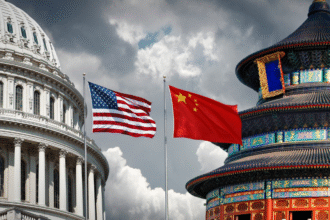Following growing demonstrations and counter-protests, Bangladesh’s diplomatic relationship with its neighbouring ally, India, is precariously poised. Alleged maltreatment of the Hindu minority in Bangladesh has caused upheaval that has stoked a war of words between the two countries and calls for questions on the stability of the area.
What preceded the demonstrations over claimed religious discrimination?
Since August, when former Bangladesh Prime Minister Sheikh Hasina left the nation following a mass revolt, tensions between the two nations have been escalating. She is currently in India, feeding the rising unhappiness between the two countries.
The arrest of Hindu monk Chinmoy Krishna Das last week was the most recent spark in this explosive scenario. Hindu groups and politicians, including members of Prime Minister Narendra Modi’s Bharatiya Janata Party (BJP), spearheaded extensive demonstrations in India following the arrest. Intense media coverage in India, which some Bangladeshi officials believe is spreading false information, has aggravated these demonstrations even more.
A top official in Bangladesh’s foreign ministry claims that Indian media sources mostly disseminate erroneous stories about the country’s affairs. ” Sadly, Indian media has gone berserk over the matter,” the official said. They are trying to present Bangladesh in the worst conceivable shade. I fail to see why they are doing this and how it will help Bangladesh or India either.”
How did the Attack on the Consulate Heighten Diplomatic Tensions in Bangladesh?
On Monday, the situation got dangerously flawed as hundreds of demonstrators rushed the Bangladesh embassy in Agartala, a city in northeastern India, and wrecked its grounds. The Indian government denounced this incident, which caused notable damage, labelling it “deeply regrettable.”
Emphasizing that they were enhancing security for Bangladesh’s diplomatic missions in India, India’s foreign ministry underlined that diplomatic and consular properties should not be targets under any conditions. The Bangladesh foreign ministry responded by characterizing the incident as “heinous” and urging an exhaustive inquiry by Indian authorities. “It is an awful and disgusting scenario. Hindu radicals entered the grounds, toppled the flag post, and defiled the [Bangladeshi] flag. The official said our cops and other employees were somewhat terrified.
Officials from Bangladesh have also urged India not to allow more acts of violence directed against their diplomatic stations. “We expect Delhi to investigate this attack thoroughly and ensure that further acts of violence are prevented,” Bangladesh’s foreign ministry spokesman said.
Why did Chinmoy Krishna Das get arrested and cause the subsequent conflicts?
The arrest of Hindu monk Chinmoy Krishna Das, brought into custody following a demonstration in Chittagong in October, has set off demonstrations in both Bangladesh and India. Having been advocating more rights for religious minorities, Das was accused of hoisting a saffron flag connected with Hinduism over the national flag of Bangladesh.
Along with several arrests, the detention set off violent conflicts that resulted in the death of a Muslim attorney and numerous injuries. Last week, a Chittagong court denied Das bail; his hearing was postponed until January 2.
A senior official of the religious group Iskcon, which Das had previously been connected with, clarified that the monk had been kicked out earlier this year for alleged misbehaviour with students. “Several pupils said Chinmoy Das mistreated them. We thus wrote letters requesting his cooperation to look into the problem. He refused to cooperate, the official stated, though.
How Is Bangladesh Attending to Issues Regarding Minority Rights?
Religious minorities in Bangladesh are living in danger while the demonstrations are still in progress. Miscreants have damaged several Iskcon temples around the nation, and campaigners have voiced worries about the government’s inability to manage religious conflicts.
A senior official in Dhaka underlined the fear minority groups in Bangladesh experience. “They have no idea what could transpires. The administration is trying [to offer security], but most people are hard to handle,” he remarked. Notwithstanding these difficulties, the interim government of Bangladesh insists that no planned attacks on minorities are taking place and has sent more troops to guard Hindu temples and other holy sites. Speaking for Bangladesh’s interim leader, a spokesman said, “There may have been some stray incidents but there are no orchestrated attacks on minorities.”
What regional consequences can religious tensions between Bangladesh and India create?
In both Bangladesh and India, religious conflicts between Hindus and Muslims are not novel. Experts worry, meanwhile, that the mounting demonstrations, provocative remarks, and media coverage could aggravate the matter and perhaps cause it to spiral out of hand.
Given their long-standing ties, a former Indian high commissioner to Dhaka voiced worry about India’s expected reaction to events in Bangladesh. In India, emotions are running strong. Bangladesh had to first deal with the lawlessness there, especially the Attack on minorities,” the former official said.
It is impossible to overestimate Bangladesh’s strategic partnership with India, especially regarding border security in India’s northeastern states. Due to their deep cultural and linguistic ties, both countries must carefully negotiate this developing dilemma.
How Could One De-escalate the Tensions?
Calling for calm, experts from both sides underline the need for both nations to participate in diplomatic communication and de-escalate tensions before the situation worsens. One analyst observed, “India and Bangladesh are neighbours who need each other.” “It’s time for the rhetoric to be toned down and for both governments to find a way to solve the fundamental problems without allowing the situation to spiral out of control.”
Ordinary people have also felt the effects of these tensions; they cross the border for travel, commerce, or medical treatment. One Bangladeshi national who crossed the border to India expressed dissatisfaction at the demonstrations last week. Reflecting the growing unease among familiar people impacted by the diplomatic deadlock, he remarked, “It’s not nice to hear people shouting slogans against your country when you cross the border.”
What Lies Ahead for India and Bangladesh?
Both nations are at a crossroads as demonstrations persist on both sides of the border. Although there is a lot of tension, the matter is still delicate, and professionals underline the need for peace and honest communication between Bangladesh and India to stop further escalation.








